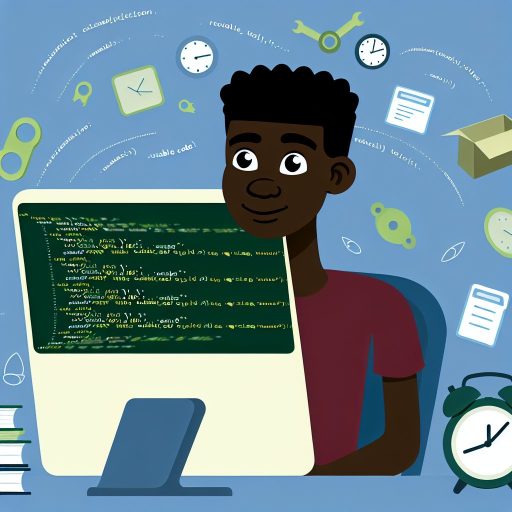Introduction
Clean code refers to code that is easy to read, understand, and maintain.
It follows clear conventions and allows developers to easily collaborate.
Clean code significantly reduces the chances of introducing bugs and facilitates future modifications.
For software development, it becomes a cornerstone for both efficiency and effectiveness.
Nigerian developers, like their global counterparts, face numerous challenges in adhering to clean coding practices.
Limited access to resources can hinder skill development.
Many developers work under tight schedules, often prioritizing speed over quality.
This urgency can lead to complex, tangled code that is difficult to debug.
Additionally, the lack of mentorship and structured training programs affects how developers learn best practices.
These challenges culminate in software that accumulates technical debt, ultimately hindering projects in the long run.
The objective of this blog post is to empower Nigerian developers.
By providing them with essential best practices, we aim to elevate the standard of coding in the region.
Each coding principle discussed will help enhance clarity, reduce errors, and boost overall productivity.
By implementing these practices, developers can improve their work and contribute positively to the tech ecosystem.
Emphasizing clean code fosters a culture of excellence among developers.
Unlock Your Unique Tech Path
Get expert tech consulting tailored just for you. Receive personalized advice and solutions within 1-3 business days.
Get StartedThrough discipline and adherence to best practices, they can build software that stands the test of time.
Ultimately, the aim is to establish a professional software development environment that encourages collaboration, knowledge sharing, and innovation.
With clean code as a guiding principle, Nigerian developers can overcome the challenges they face in their careers.
This understanding not only fosters individual growth but also propels the entire tech industry forward.
Clean code practices will enhance the quality of software outputs, leading to more robust applications that serve users well.
Understanding Clean Code
Clean code forms the backbone of efficient programming practices.
It encompasses a set of principles that help developers write readable, maintainable, and bug-resistant code.
Every line of code should contribute to the program’s functionality while remaining simple and elegant.
Principles of Clean Code
Clean code relies on various principles that guide developers in their coding practices.
Familiarizing oneself with these principles is crucial for writing high-quality code.
Here are some key principles:
- Readability: Code should be easy to read and understand for anyone, including future developers.
- Maintainability: The code should be structured in a way that makes updates and modifications straightforward.
- Single Responsibility Principle: Each function or class should have one reason to change, promoting targeted changes over widespread ones.
- Consistent Naming Conventions: Names should clearly reflect the purpose of the variables, functions, or classes they represent.
- DRY (Don’t Repeat Yourself): Avoid redundancy by abstracting code, ensuring that knowledge is not duplicated.
- KISS (Keep It Simple, Stupid): Write code that is as simple as possible, avoiding unnecessary complexity.
- Testability: Code should be written in a way that makes it easy to test its functionality.
Benefits of Clean Code
Writing clean code yields significant benefits.
Understanding these benefits can motivate developers to prioritize clean code practices.
Here are some of the notable advantages:
Unlock Premium Source Code for Your Projects!
Accelerate your development with our expert-crafted, reusable source code. Perfect for e-commerce, blogs, and portfolios. Study, modify, and build like a pro. Exclusive to Nigeria Coding Academy!
Get Code- Improved Maintainability: Clean code is easier to maintain and update, reducing technical debt.
- Enhanced Readability: Clear code allows developers to grasp the functionality quickly, minimizing onboarding time.
- Reduced Bugs: Organized and straightforward code inherently reduces the chances of errors, leading to fewer bugs.
- Greater Collaboration: When code is clear, multiple developers can work on it simultaneously without confusion.
- Faster Development: Clean code accelerates development by making it easier to extend features or fix issues.
- Increased Confidence: Developers feel more assured when making changes to well-structured code.
Examples of Clean Code vs. Poor Code Practices
To better illustrate the difference between clean and poor code, let’s examine a simple function that calculates the area of a rectangle.
We will look at two versions: one with clean code principles applied and one that ignores them.
Example of Poor Code
function a(x1, y1, x2, y2) {
return (x2 - x1) * (y2 - y1);
}
This function demonstrates several poor coding practices:
- Unclear naming: The function name “a” does not convey its purpose.
- Ambiguous parameters: The parameters lack meaningful names, making it difficult to discern their roles.
- Lack of comments: The function provides no guidance on how it operates.
Example of Clean Code
function calculateRectangleArea(topLeftX, topLeftY, bottomRightX, bottomRightY) {
const width = bottomRightX - topLeftX;
const height = bottomRightY - topLeftY;
return width * height;
}
This version exemplifies clean code principles through:
- Descriptive naming: The function and parameters clearly indicate their purpose and functionality.
- Readable structure: The use of constants enhances understanding by breaking down the process.
- Potential for comments: This clear structure allows for easily adding comments if needed.
Transitioning to Clean Code
Adopting clean code practices requires motivation and commitment.
Nigerian developers, like others worldwide, can benefit from transitioning to these best practices.
Here are strategies to help make this shift:
- Start Simple: Begin with small projects to implement clean code principles.
- Read Books on Clean Code: Various resources provide insights into writing clean code.
- Conduct Code Reviews: Regularly review each other’s code to identify poor practices and share best practices.
- Create Style Guides: Establish company-wide coding conventions to promote consistency.
- Practice Refactoring: Make it a habit to review and improve existing code regularly.
The success of any software project largely depends on the quality of its code.
Clean code enhances functionality and guarantees efficient collaboration among developers.
Importance of Meaningful Naming Conventions
Names in code communicate intent.
Choosing meaningful names for variables and functions significantly influences readability.
Here are some guidelines for effective naming:
- Use Descriptive Names: Choose names that describe the purpose of the variable or function. Instead of abbreviated names like
calc, usecalculateTotalPrice. - Avoid Generic Names: Names like
dataortempdo not convey specific meanings. These names can confuse developers who read the code later. - Be Consistent: Maintain consistency in naming conventions throughout your codebase. If you choose camelCase, use it everywhere.
- Context Matters: Include context in names to make their usage clear. For example,
customerOrderCountis clearer thancount. - Limit Abbreviations: While some abbreviations may be common, unnecessary abbreviations can lead to misunderstanding. Use abbreviations sparingly.
Implementing these naming conventions fosters an environment where code becomes self-explanatory.
Developers can easily follow the flow and functionality without needing excessive explanations.
The Role of Comments in Clarifying Complex Logic
Comments serve as a bridge between the code and the reader’s understanding.
However, effective comments enhance clarity while poor comments create confusion.
Here are tips for writing impactful comments:
- Explain Why, Not What: Code often describes what it does. Use comments to explain why certain decisions were made or why specific algorithms were chosen.
- Avoid Redundancy: Do not restate what the code is doing if it is already clear. Instead, focus on providing insights into complex logic.
- Use TODOs for Future Work: Mark areas needing improvements with
TODOcomments. This highlights potential future changes or enhancements. - Document Public Interfaces: When writing libraries or APIs, comment on the parameters and return values. This helps users understand how to utilize your code.
- Update Comments Regularly: Outdated comments can mislead developers. Ensure comments reflect any changes made to the code.
Through judicious use of comments, developers can clarify complex logic.
This practice prevents assumptions and reduces the time needed for code reviews and maintenance.
Structuring Code for Readability and Organization
Code organization plays a critical role in software development.
A well-structured codebase promotes collaboration and enhances maintainability.
Here are key practices to consider:
- Use Functions to Modularize Code: Break down complex tasks into smaller, manageable functions. Each function should perform a single job, improving focus and readability.
- Group Related Functions: Organize functions according to their functionality. Place related functions within the same file or module to create a logical structure.
- Implement Classes Effectively: When using Object-Oriented Programming (OOP), design classes thoughtfully. Each class should encapsulate related properties and methods.
- Maintain a Consistent Structure: Follow a consistent coding structure across the entire project. Use a uniform format for functions, classes, and modules.
- Leverage Namespaces: Use namespaces to avoid naming conflicts and organize code better. Namespaces prevent ambiguities in large codebases.
Structural organization leads to enhanced readability and eases future modifications.
New developers can quickly familiarize themselves with the project.
It also facilitates a more efficient onboarding process.
Mastering clean code is an ongoing journey for developers.
Adopting best practices like meaningful naming conventions, effective commenting, and code structuring can dramatically improve the quality of your code.
As Nigerian developers navigate the tech landscape, these principles will enhance their productivity and collaboration.
Clean code builds a foundation for innovation and efficiency.
Invest time in refining your coding practices and urge your peers to do the same.
With commitment and diligence, we can elevate Nigeria’s software development community and deliver exceptional solutions to global challenges.
Delve into the Subject: Why Following Best Coding Practices is Critical for Nigerian Startups
Understanding the Importance of Consistent Coding Standards
Consistency in coding standards is crucial for any software development team.
It enhances readability and maintainability of code.
When all developers on a team adhere to the same guidelines, the team can easily collaborate.
It also reduces the time spent debugging code, which is immensely beneficial for developers, especially in high-pressure environments.
Nigerian developers can greatly improve their coding practices by following established conventions.
The Necessity of Adhering to Coding Standards
Adhering to coding standards brings numerous advantages:
- Improved Readability: Code becomes easier to read and understand for all team members. Clear formatting aids comprehension.
- Faster Onboarding: New developers can more quickly adapt to a project. Familiarity with a codebase reduces the learning curve.
- Enhanced Collaboration: Team members can easily work on each other’s code. Uniformity in code style fosters smooth collaboration.
- Reduced Code Review Time: Reviewers spend less time understanding code. Consistent formatting makes review processes quicker.
- Easier Maintenance: Maintaining code becomes simpler and less error-prone. Future updates or changes can be implemented without confusion.
These benefits demonstrate that neglecting coding standards can lead to misunderstandings.
Developers might struggle to interpret others' code when standards vary.
Consequently, teams should prioritize establishing and adhering to coding standards.
Popular Coding Style Guides
Different languages have well-respected style guides. Here are some widely used guides:
- PEP 8 for Python: This guide emphasizes readability and consistency. It provides specific rules for naming, indentation, and spacing.
- Google’s Java Style Guide: This guide outlines essential practices for writing Java code. It covers naming conventions, line length, and code organization.
- Airbnb JavaScript Style Guide: This popular guide provides rules for writing clear and consistent JavaScript. It includes best practices for ES6 syntax and usage.
- Ruby Style Guide: This comprehensive guide offers conventions for Ruby code. It focuses on readability and idiomatic Ruby code.
- Microsoft’s C# Coding Conventions: This guide covers naming conventions and coding practices for C#. It helps ensure code clarity and consistency across C# projects.
By following established guides, developers can help maintain clarity, consistency, and quality in their code.
Every development team should officially endorse one or more of these styles.
This action promotes a standardized approach across the team.
Tools and Resources for Maintaining Consistency
Utilizing tools and resources can significantly enhance adherence to coding standards:
- Linters: Tools like ESLint for JavaScript and Flake8 for Python can automatically check code against style guides. They help identify violations in real-time.
- Code Formatters: Tools such as Prettier for JavaScript and Black for Python reformat code consistently. They ensure that the code adheres to the chosen style guide automatically.
- Integrated Development Environments (IDEs): Most modern IDEs offer built-in support for style guides. They help enforce coding standards as developers write code.
- Continuous Integration (CI) Tools: CI tools like Jenkins or Travis CI can automate style checks during the build process. They ensure code adheres to standards before merging.
- Documentation and Team Agreements: Documenting style choices promotes transparency. Teams should explicitly define agreements on coding standards and share them across the team.
The right combination of tools can streamline the coding process.
They alleviate the burden of manual checks and foster adherence to standards effortlessly.
Significance of Coding Standards for Developers
Consistent coding standards are fundamental for professional developers.
They significantly enhance collaboration, readability, and maintainability of code.
Nigerian developers can implement these practices to improve their coding efficiency.
Adopting popular coding style guides ensures a shared understanding among team members.
Moreover, utilizing available tools and resources simplifies adherence.
Ultimately, embracing consistent coding practices will lead to better software, smoother teamwork, and thriving career growth in the competitive tech landscape.
Explore Further: Essential JavaScript Best Practices Every Nigerian Developer Should Know
The DRY Principle in Software Development
The DRY principle stands for “Don’t Repeat Yourself.” This principle is crucial in software development.
It encourages developers to reduce the repetition of code and logic.
By avoiding redundancy, developers can enhance code maintainability and readability.
In this section, we will explore the DRY principle in detail.
Understanding the DRY Principle
The DRY principle aims to eliminate redundancy in code.
It promotes the idea that every piece of knowledge must have a single, unambiguous representation within a system.
Hence, when you need to change a piece of logic, you can do it in one place.
This significantly reduces the risk of errors.
In practice, adhering to the DRY principle saves time and effort during development and debugging.
If a developer changes a method, they won’t need to track down multiple places in the codebase.
They can modify it in one location, ensuring consistency throughout the entire application.





